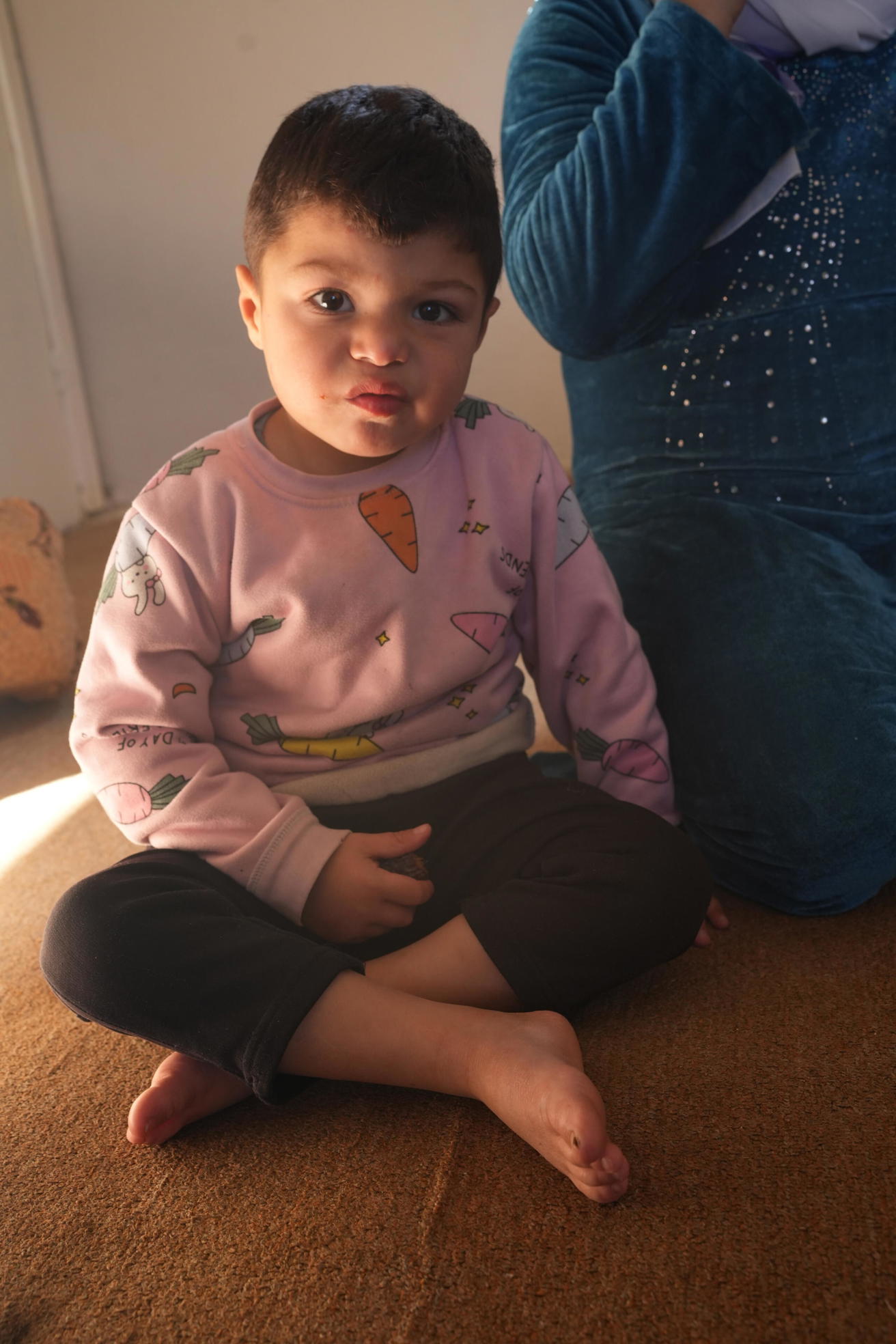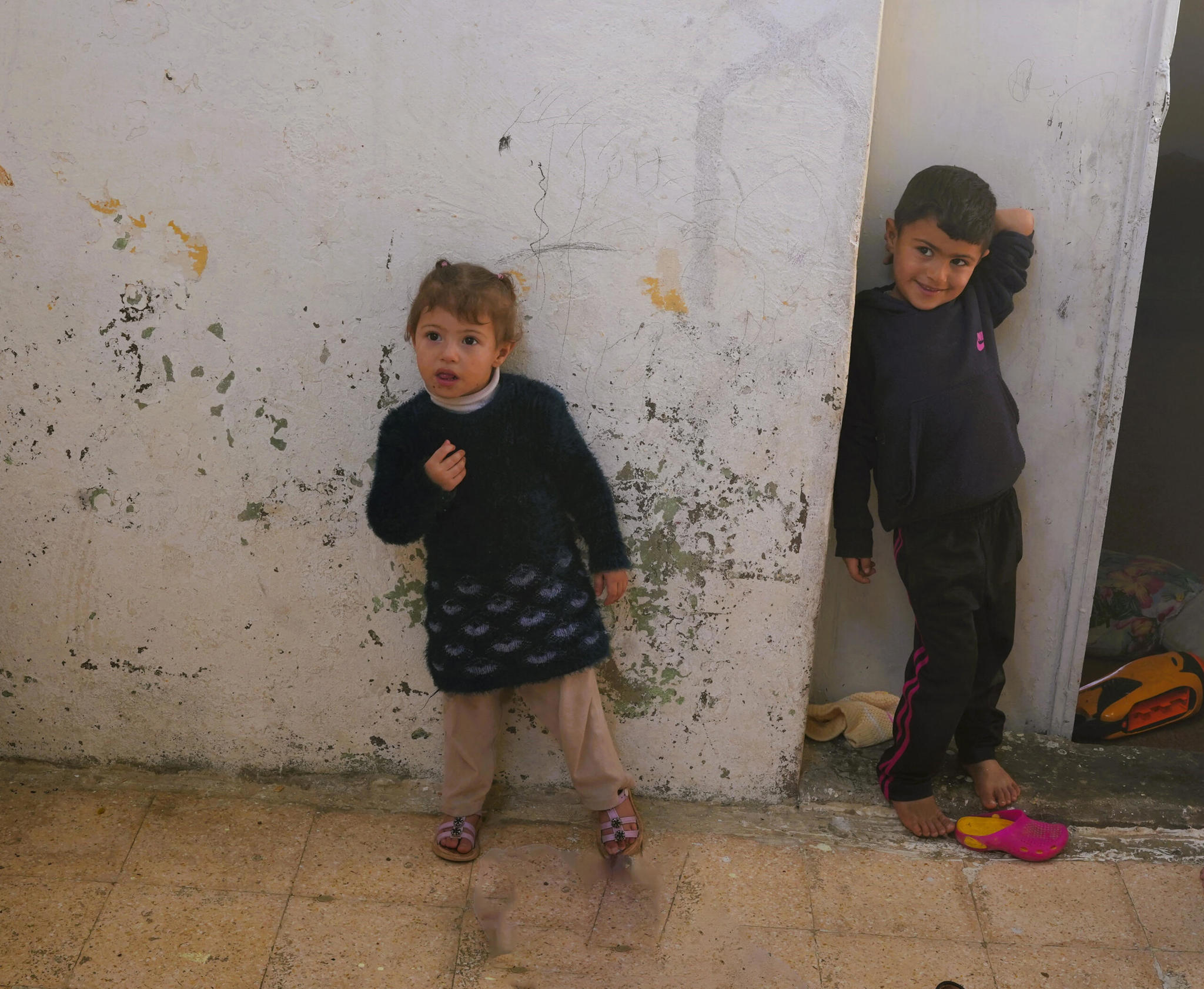As soon as we walk through the door, Hanan greets us with a question: “What time is it, is it exactly 10.00?”
Her enquiry catches us off guard. At first, we wonder if our visit at this time has inconvenienced her, but Hanan quickly explains that she needs to give her son Hammoudeh his medicine at precisely 10.00 every day. Hammoudeh, who had been experiencing seizures since he was seven months old, depends on this precise routine to survive.
Hanan has no way of telling the time in her house. She never learned to read or write, nor does she own a mobile phone. "I knock on our neighbour's door to ask about the time," she says.
Hanan, her husband Adnan, and their three children live in a small, rented apartment in Madaba, next to a waste dump. Piles of trash almost touch the only windowsill, near to where we sit. Looking around, the room is eerily empty – no TV or heater in sight. After chatting for an hour, Hanan confesses to us that the worn carpet and seating pads were fetched from a waste dump and that they do not have a fridge to store food or medicine.
Visibly pregnant, Hanan keeps moving around, looking after her energetic children.
Adnan is out looking for work. As a daily labourer, his job is often irregular – he might work for two or three days, then be without work for a week or longer.
From missed education to misleading documentation
Although her ID states that she is nearly 17, Hanan is actually 21. "I was told that I was four years old when they issued my birth certificate," she explains. Hanan was born in Aleppo, Syria. In Syria’s rural areas, it is not uncommon for births to go unregistered for years due to a lack of resources or awareness.
After fleeing the war in Syria, Hanan arrived in Jordan at the age of 10. In Syria, she never had the chance to attend school, and her primary education in Jordan was sporadic at best. After receiving her refugee ID, she briefly attended school in Irbid, northern Jordan for a year, then dropped out for two years before returning to school for a short period of time.
"My mother was trying to work and provide for us, so I had to stay home to take care of my brothers. I could only go to school when she was off work," Hanan recalls. After her marriage, she could no longer continue her education, and the pressures of poverty and uncertainty kept her tethered to her home and family.
Hanan was married at the age of 16 in Jordan. Due to her age, Hanan and Adnan married informally and did not document the marriage officially. As the marriage was not legally recognised, they were unable to register the births of their children. In Jordan, the legal age for marriage is 18. Exceptions can be made for individuals who have reached 16 years of age, but only with approval from the Supreme Judge Department and the bride’s and groom’s parents.
Because of the four-year age difference between Hanan’s actual age and her official age, Hanan and Adnan sought legal assistance from the Norwegian Refugee Council (NRC) when Hanan's identity papers showed she had reached the age of 16. With the help of NRC's Information, Counselling and Legal Assistance (ICLA) programme, they legalised their marriage and obtained birth certificates for their children.

Before legalising their marriage and obtaining birth certificates, Hanan, Adnan and their children were unable to access basic services such as healthcare. "I could not admit my son to the hospital when he got sick because we did not have proper identification papers. I could only take him to small local clinics," Hanan explains.
A mother’s worst nightmare
The situation took a frightening turn when their then three-year-old son, Hasan, went missing. He had wandered off to the supermarket, which was on the same block. His family realised he was missing 15 minutes later and started to look for him. As it turned out, someone had found him crossing the street and took him to the nearest police station. However, the police refused to return Hasan to his mother because she had no formal proof that he was her child. Hasan tried showing them photos, but the police demanded formal documentation, such as a letter from the local Mukhtar [community leader] stating that two witnesses had testified that these were the children of Hanan and Adnan..
Hanan and Hasan were then taken to the Family Protection Unit, and Hanan's other children, Hammoudeh and Aya, were summoned through her in-laws. The situation seemed dire, but Hanan did not give up. She immediately contacted NRC's legal team, which acted swiftly, speaking to the Family Protection Unit that same night and accompanying Hanan to court the following morning.
After three court sessions, the Sharia court issued a ruling confirming Hanan and Adnan's marriage and the kinship of their children. This victory allowed them to secure birth certificates for Hasan, Hammoudeh and Aya. They were also able to secure asylum seeker certificates, which enabled them to receive MOI (Ministry of the Interior) cards – essential for accessing basic services such as public health facilities and schools.
Documents in hand, but trapped in poverty
Despite their legal triumph, Hanan's family have another hurdle to overcome. Her son Hammoudeh, 3, is unable to receive adequate treatment for his seizures because his family cannot afford to pay his medical expenses.
"When he was around seven months old, he was almost motionless. He could not express needs like being hungry. Then the seizures started. At first, I did not understand what was going on with my baby," recalls Hanan.
Hammoudeh's doctor prescribed him medicine and vitamin supplements, but Hanan could not afford to buy his medicine for a whole year, during which time his condition worsened.
"I have to pay 30 JDs [Jordanian dinar] as appointment fees, then add to that the cost of transport from Madaba to Amman. It adds up to around 40 JDs. We cannot afford that," she laments.
The family's situation became unbearable when Adnan broke his arm and was unable to work for months. With no income, they fell behind on rent, accumulating two years' worth of unpaid rent.
Now, the doctor has requested new EEG and MRI scans for Hammoudeh, but Hanan doesn't know how she will afford them. "The MRI alone costs around 130 JDs, while Adnan's daily earnings can be as low as 10 JDs if he finds work." Last time, Hanan had to borrow money from a close friend to cover the costs.
Clinging on to hope for her child's future
Throughout everything, Hanan's deepest wish remains to find proper medical care for her sick child. "My wish is to emigrate to a country where my son can receive the treatment he needs. That’s all I think about now,” she says.
While NRC's ICLA programme, with the support of the EU Civil Protection & Humanitarian Aid (ECHO) has helped her resolve her documentation issues, the barriers Hanan and her family face are now primarily financial. Both she and her husband are unemployed, and as non-Jordanians, their access to employment is restricted to permissible occupations – such as agricultural labour, factory work, and carpentry – and requires costly work permits. Many Syrian refugees, including Hanan's family, are stuck in a cycle of poverty and uncertainty.
Hanan is pushing through a life full of worries and hardship, from being misdocumented and fearing for the health and safety of her children, to struggling to survive with limited resources, and all without an education to help her. Yet, she doesn’t give up the fight for a better future for her children. She holds onto hope: a hope for her son's health, for stable livelihoods, and for the opportunity to build a life where her family can finally thrive.

***
Sign up to our newsletter to read more stories from around the world.


